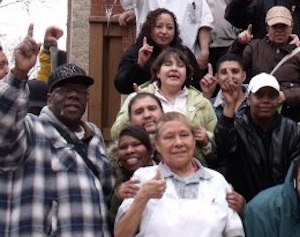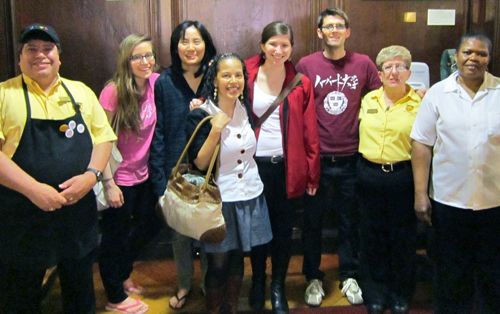 Northwestern University dining hall workers celebrating new contract as part of the students’ living wage campaign.“They took our knives and gave us scissors to open bags of frozen food. I want my knives back so I can cook again.” That’s what a kitchen worker at a prominent university told me recently at one of a dozen of gatherings around the country convened by our union, Unite Here. The idea was to bring food service workers and college students together to discuss the intersection of food and work in anticipation of Food Day, a national day designed to “bring together Americans from all walks of life to push for healthy, affordable food produced in a sustainable, humane way.”
Northwestern University dining hall workers celebrating new contract as part of the students’ living wage campaign.“They took our knives and gave us scissors to open bags of frozen food. I want my knives back so I can cook again.” That’s what a kitchen worker at a prominent university told me recently at one of a dozen of gatherings around the country convened by our union, Unite Here. The idea was to bring food service workers and college students together to discuss the intersection of food and work in anticipation of Food Day, a national day designed to “bring together Americans from all walks of life to push for healthy, affordable food produced in a sustainable, humane way.”
Unite Here, where I work as director of the Sustainable Food Project, is the largest organization in the country representing food service workers. And we’re heartened to see campus dining workers who want to cook again — to make food from scratch using real ingredients. Instead of being tasked with heating and serving processed and pre-prepared meals, they want to use their skills in the kitchen to cook food they’re truly proud to serve.
“Food is love,” said one cook at a university in Chicago. “Bringing in packaged food … is sort of an insult. We actually want to chop, we want to make sauces and make our own stocks, we want to make food with our hands.”
But this widely felt sentiment is only one reason we’re drawing attention to food service workers on Food Day. After spending so much time in campus kitchens, we know that workers are important allies in transforming our food system and we want to bring that to the foreground of this important national event. They’re allies in part because they have so much at stake: Food workers are among those most affected by the food crisis. They are frequently underpaid and they suffer from food insecurity and diet-related illnesses at alarming rates:
- The annual median wage for food workers on college campuses in 2010 was $17,176, which is substantially below the federal poverty level of $22,050 for a family of four.
- Nearly one out of four food service workers live in food insecure households, and 31 percent are at risk for diet-related illnesses like diabetes, stroke, and heart disease — the highest rate of all occupations in the United States.
- Because they’re paid poverty wages, 13 percent of food service workers lived in households that utilized food stamps at some point during the last year, nearly double the national average.
To make the food system work for food service workers — and all workers in the food chain — we must address one of the root causes of the crisis itself: the growing levels of poverty and economic inequality in the United States. In higher education, where Unite Here represents food workers at over 100 college campuses, an alliance of students, workers, and food activists is stepping up to take on this challenge.
 Harvard dining workers and students gathering for planning of Food Day.At Northwestern University, students and workers built relationships that formed the basis of a vibrant and ongoing living wage campaign. The result was not only substantially increased wages and benefits in the dining halls in 2011, but also a new student culture that recognizes food workers as central to campus life. At Georgetown University, students and faculty played a crucial role in helping food workers organize their first union in 2011.
Harvard dining workers and students gathering for planning of Food Day.At Northwestern University, students and workers built relationships that formed the basis of a vibrant and ongoing living wage campaign. The result was not only substantially increased wages and benefits in the dining halls in 2011, but also a new student culture that recognizes food workers as central to campus life. At Georgetown University, students and faculty played a crucial role in helping food workers organize their first union in 2011.
Food service workers represented by unions earn 26 percent more in pay than food workers without a union, or $5,512 a year. That may not seem like big money for some, but for workers below the poverty line, it’s can go toward fresh and healthy food for their families.
Food service workers bring tremendous assets to the movement for real food. In addition to diversity and energy, they bring a unique vantage point from which to monitor the safety and quality of food. When we’ve asked workers about food quality in campus kitchens, we’ve heard stories from people instructed to place “Organic” labels on conventional produce, falsify food expiration dates, keep food at dangerous temperatures, and serve lots of food that’s simply bad.
But without protection from retaliation from their employers, workers fear speaking out about these practices. Union contracts help provide such protections, underscoring the point that strengthening the rights of food workers can also help address concerns about food safety.
We know that a national day of action, like Food Day, won’t change our food system overnight. But we also know that it has helped move forward a dialogue between food workers, students, and university faculty about how to change our food system. This open dialogue has helped to break down many barriers and to connect diverse communities — benefits that will be felt long after Food Day is over. And as we see it, that’s a recipe for long-term change.




